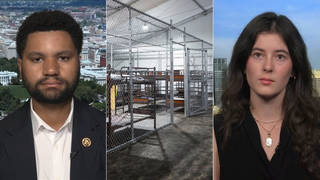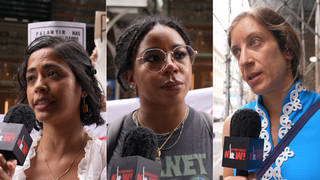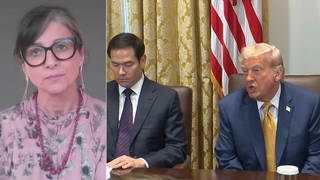
The highest courts in two states delivered rulings within hours of each other Thursday that set back efforts of gay and lesbian couples to win marriage rights. The New York Court of Appeals rejected same-sex couples’ bid to marry and the top court in Georgia upheld a Constitutional amendment banning gay marriage in the state. [includes rush transcript]
Yesterday, the highest courts in two states delivered rulings within hours of each other that set back efforts of gay and lesbian couples to win marriage rights. The New York Court of Appeals rejected same-sex couples” bid to marry and the top court in Georgia upheld a Constitutional amendment banning gay marriage in the state.
The New York court ruled 4-2 that the state’s definition of marriage as a union between a man and a woman was constitutional and that it was up to the State Legislature, not the courts, to decide whether it should be changed.
One of the two dissenters was the Chief Judge of the Court, Judith Kaye. In her dissent she wrote that barring gay marriage is akin to laws that once prohibited interracial marriage. She went on to write that, “This state has a proud tradition of affording equal rights to all New Yorkers. Sadly the court today retreats from that proud tradition. I am confident that future generations will look back on today’s decision as an unfortunate misstep.”
A rally protesting the court’s decision was held in the West Village in New York City last night. Crowds gathered at Stonewall where gay and transgendered bar patrons resisted a 1969 police raid that is widely considered the beginning of the modern gay rights movement.
Reverend Pat Bumgardner of the New York Metropolitan Community Church was one of those who addressed the rally.
- Rev. Pat Bumgardner, New York Metropolitan Community Church.
For more on the rulings we speak with an attorney involved in the case:
- Alphonso David, staff attorney at the National Headquarters of Lambda Legal which was one the main organizations involved in the gay marriage case.
Transcript
AMY GOODMAN: This is the Reverend Pat Bumgardner of the New York Metropolitan Community Church speaking at the rally.
REV. PAT BUMGARDNER: Today, we learned that four of the six judges on the New York State Court of Appeals believe that it is untenable that domestic relations law permit same-sex marriage. We heard that the law clearly limits marriage to opposite-sex couples; that such limitation is rational, because marriage is important to the welfare of children; that this was the universal understanding when our statutes were crafted. But it wasn’t. It wasn’t the universal understanding when Ruth pledged undying fidelity to another woman. Wherever you go, I will go. Wherever you live, I will live.
So we are seeking to have a universal civil right recognized. Maybe the New York State Catholic Conference, maybe the American Family Association, maybe all the folks who like to cite moral authority for our exclusion from this basic human right, should take note of the fact that it was two women who provided the Bible’s only death-to-us-part public relational pledge.
Today, we heard that because we generally do not bear children by accident — what a compelling principle to base equality upon — because our households are more likely to have children, if we have them, because we want them, we don’t need the same encouragement toward stability, the same social supports and benefits. We heard that prejudice and discrimination is more worthy of correction for some people than for others.
We could offer many critiques tonight and respond in many ways, but perhaps the most critical thing right now is to say, simply and forthrightly, all this decision means is that the fight for equality has just begun. All this means, all it means, is that we will continue to fight in the city and in the state and in this nation until justice is no longer denied us. What it must mean is that we must give up the luxury of thinking things will be okay if we just mind our manners and play along with those who hold life-and-death recognition over our heads.
You know, it is against the law for me to tell you who to vote for, but it is not against the law for me to tell you who not to vote for. Don’t vote for anyone who doesn’t vote for you and me. It is that simple. That simple. Don’t vote for anyone who doesn’t vote for you and for me. You know, they accuse us, when we say vote for only people who support queer rights, they accuse us of being single-issue voters. But I’m not a single-issue voter. The people in the legislature, who aren’t holding up their end of the deal, are the single-issue voters, because they don’t see the connection between queer rights and immigration rights and a just and fair wage for all of us and childcare for all the people who hold down two jobs.
We, our battles, are often disparagingly compared to the Civil Rights Movement in this country, but the only way in which the fight for queer equality on all fronts, including marriage equality, falls short of that legacy is that we have not been persistent in taking to the streets, in demonstrating and in protesting. The courts, the legislature will not think we are worth saving until we show them that we think we are worth saving. So this is my prayer tonight, that this defeat will become our motivation to do the moral and the just and the holy thing and fight like heaven until all of our relationships are equally recognized and protected.
AMY GOODMAN: The Reverend Pat Bumgardner of the New York Metropolitan Community Church speaking at a rally in New York city yesterday. We’re joined now by Alphonso David. He’s a staff attorney with Lamda Legal, which was one of the main groups involved in the gay marriage case. We welcome you to Democracy Now!
ALPHONSO DAVID: Hi.
AMY GOODMAN: Can you talk about — let’s start with New York, then we’ll talk about Georgia — what exactly happened?
ALPHONSO DAVID: Yesterday, we received a disappointing ruling from the highest court here in New York, the Court of Appeals. It was a plurality decision, decided by three judges with a concurring opinion from another judge, that held that under New York’s Constitution, same-sex couples do not have the right to marry.
The court relied on two bases for reaching that conclusion. One, that as a matter of law, same-sex couples — it’s better for children to be raised in different-sex households than same-sex households. And the court based that on intuition and experience. And secondly, the court held that accidental procreation — because heterosexual couples accidentally procreate, the government can have an interest in furthering a stability of heterosexual relationships. Therefore, different-sex couples should have the right to marry, and same-sex couples should not, and the government can try to further those relationships by excluding same-sex couples.
The dissent issued a very, very powerful statement, by saying that there’s no evidence that this reason that the government has articulated is furthered by excluding same-sex couples from marriage. Different-sex couples will not procreate because same-sex couples cannot marry. So the interest that the government articulates is not furthered by excluding same-sex couples from marriage.
JUAN GONZALEZ: And in the Georgia case, there had actually been a constitutional amendment, previously overwhelmingly passed by Georgia voters. What did the Georgia court decide? Had that amendment been overturned in a lower court, and then it was reinstated, or was it just upholding the amendment?
ALPHONSO DAVID: In Georgia, the General Assembly passed a Senate resolution, placing on the ballot a constitutional amendment that would provide that in the State of Georgia, only marriages between different-sex couples, between a man and a woman, would be respected, that marriages between same-sex couples would not be respected, and that no union between same-sex couples would be respected in the State of Georgia. Now, we challenged that constitutional amendment, because —
JUAN GONZALEZ: And that amendment was passed?
ALPHONSO DAVID: That amendment was passed by the voters in Georgia. And we challenged that constitutional amendment on the grounds that it violated the single-subject rule, and that’s the rule that provides that voters should have the right to only vote on one issue. And the constitutional amendment basically forced them to vote on several issues: one, whether or not marriage should be limited to different-sex couples; two, whether or not the State of Georgia has the right not to respect unions, any type of union between same-sex couples. Now, it was conceivable that a voter in Georgia could conclude, I don’t necessarily believe that same-sex couples should have the right to marry, but I think that they should have the right to have a civil union. Now, the voters in Georgia didn’t have that choice, so we challenged the constitutional amendment as being violative of the single-subject rule. And the trial court agreed with us, saying that it did violate the single-subject rule. And it was appealed to the high court, the Supreme Court in Georgia, and they concluded that the single-subject rule was not violated, that the constitutional amendment was procedurally proper.
AMY GOODMAN: How does this fit in, the New York decision, going back to that, to the politics of New York? You had some very odd situations, where you had the Mayor speaking out possibly for gay marriage, but he had supported this case. Then you had Eliot Spitzer, who is the Attorney General, running for governor, whose office brought this case against gay marriage.
ALPHONSO DAVID: It’s odd. The arguments that both the Mayor and the Attorney General proffered to the court were, we think, baseless. But the Attorney General and the Mayor argued that they had an obligation as public officials to defend the law in the State of New York. Although personally they disagreed with the law, they felt that they had an obligation to enforce it, which is why you see this conflict.
AMY GOODMAN: And so, they’re saying, we want to see the legislature change the law here; it shouldn’t be the courts that do it.
ALPHONSO DAVID: Correct. Both the Mayor and Attorney General Spitzer have made public statements that they support the right to marry for same-sex couples and that they will work in the legislature to make sure that that happens. So now, we have to make sure that we hold them to their word, that they really will go to the legislature in Albany and make sure that same-sex couples have equality in New York, because as it stands now, they’re treated as second-class citizens. They do not have the right to marry.
JUAN GONZALEZ: Now, this issue has been fought out in state after state. Now, there’s about 40 states that either have a constitutional amendment or a statute that forbids marriage between gay couples. Now, what is your movement and your efforts? Where do you go next?
ALPHONSO DAVID: Well, we continue to do what we’ve been doing. And our efforts depend or change depending on the circumstances. We are working in several states around the country to make sure that relationships between same-sex couples are respected. And we need to keep in mind that, although in New York we’re dealing with marriage, in other jurisdictions we’re not necessarily dealing with marriage. We might be dealing with civil unions, or we might be dealing with domestic partnership laws, or we might be dealing with adoption, or we might be dealing with foster care. What we try to make sure is that relationships between same-sex couples and families, same-sex couples that do have families, that those relationships are respected under state law, not only in terms of statutory law, but also the Constitution. So, we continue to move forward.
And we should keep in mind — I was mentioning to a colleague of mine that we should keep in mind that, you know, several years ago the arguments as to why same-sex couples should not have the right to marry were radically different. In 1986, it was criminalized. Same-sex couples could not have private consensual intimate conduct or engage in private consensual intimate conduct. And the U.S. Supreme Court reversed that decision, the Bowers v. Hardwick decision, with the Lawrence v. Texas decision. And so the arguments that are now proffered as to why relationships between same-sex couples should not be respected have radically changed. They can’t reach for those arguments anymore, because empirical evidence shows that there’s no support for it. And also, in New York, at least, public opinion shows that there isn’t. In New York, 53% of people believe that same-sex couples should have the right to marry. That’s the majority.
AMY GOODMAN: Alphonso David, I want to thank you very much for being with us, staff attorney at the National Headquarters of Lamda Legal here in New York, one of the groups that brought these cases both in New York and Georgia.













Media Options